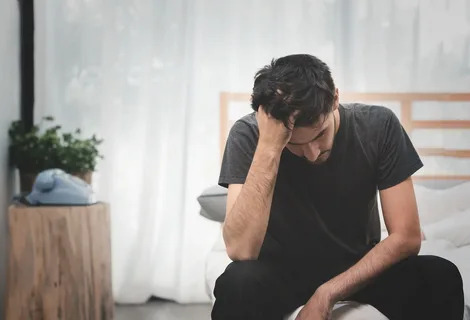Anxiety and insomnia are common disorders that have a big effect on people’s quality of life. Anxiety, a disorder defined by a continuous sense of worry, fear, or unease, frequently coexists with insomnia, which is characterized by difficulty sleeping or staying asleep. Although there are many treatment options for insomnia and anxiety, such as medication and therapy, lifestyle changes can be very important in controlling and reducing their symptoms. This post will discuss a number of lifestyle changes that can improve wellbeing and assist people in controlling their anxiety and insomnia.
Knowing About Sleep Disorders and Anxiety
A frequent sleep ailment affecting people of all ages and backgrounds is insomnia. It can show up as a variety of symptoms, such as trouble falling asleep, numerous nighttime awakenings, or waking up too early and not being able to go back to sleep. When chronic insomnia lasts for three months or longer, and occurs at least three nights a week, it can have a major negative impact on general health and wellbeing.
Conversely, anxiety is a natural reaction to stress and in some circumstances, it can even be protective. On the other hand, excessive or persistent worry can cause problems with day-to-day functioning and sleep patterns. Anxiety is often accompanied by tense muscles, racing thoughts, and a difficulty relaxing, all of which make it harder to fall asleep.
The Connection Between Anxiety and Insomnia
Anxiety and insomnia frequently overlap and aggravate one another, resulting in a difficult cycle to escape. For instance, people who suffer from insomnia could get more anxious about not being able to go asleep, which could raise their arousal and cause more sleep disturbances. On the other hand, those who experience worry may find it difficult to unwind and quiet their brains, which makes it harder to get to sleep and stay asleep.
In addition, insomnia’s sleep deprivation can exacerbate anxiety symptoms by making people more irritable, less able to focus, and more sensitive to emotions. This feeds the vicious cycle of worry and insomnia, which has a number of detrimental effects on general wellbeing.
Modifying Your Lifestyle to Manage Your Anxiety and Insomnia
Create a Regular Sleep Schedule
Even on weekends, establish a regular bedtime and wake-up time to help your body’s internal clock function properly.
Establish a calming nighttime routine to let your body know when it’s time to unwind. This could involve reading, having a warm bath, or engaging in relaxation exercises like meditation or deep breathing.
Refrain from taking naps during the day since this may disrupt your sleep at night.
Establish a Cozy Sleep Environment
Keep your bedroom cold, dark, and quiet to create a sleeping environment.
Invest in pillows and a comfy mattress to promote sound sleep.
Avoid using displays, such as computers, tablets, and cellphones, right before bed since the blue light they emit can disrupt your body’s normal circadian rhythm.
Use Stress Reduction Strategies
To relieve tension and encourage relaxation, practice deep breathing, progressive muscle relaxation, or mindfulness meditation.
Determine the stressors in your life and create coping mechanisms to deal with them. This could entail establishing limits, learning time management skills, or asking friends, family, or a therapist for assistance.
Make Exercise a Priority
Frequent exercise can lessen anxiety symptoms and enhance the quality of sleep. On most days of the week, try to get in at least 30 minutes of moderate-intensity exercise.
To encourage relaxation and lower stress levels, include exercises that focus on relaxation into your workout regimen, such as yoga, tai chi, or light stretching.
Adopt Good Sleep Practices
Alcohol, nicotine, and caffeine should be avoided right before bed since they can make it difficult for you to fall asleep and stay asleep.
Establish a relaxing nighttime ritual to aid in your relaxation and sleep preparation. This could involve doing things like reading, having a warm bath, or listening to relaxing music.
Make sure your bedroom is cold, dark, and quiet, and that your mattress and pillows are supportive to provide the most pleasant sleeping environment possible.
If Needed, Seek Professional Assistance
If making lifestyle changes isn’t enough to control your anxiety and insomnia, don’t be afraid to get expert assistance.
A medical expert or mental health specialist can evaluate your symptoms and suggest the best course of action, which may involve counseling, medication, or both.
In summary
Although anxiety and insomnia are prevalent disorders that can greatly affect a person’s quality of life, managing and reducing symptoms can be greatly aided by changes in lifestyle. People can improve their sleep hygiene, prioritize physical exercise, use stress-reduction strategies, establish regular sleep schedules, make their sleep environment comfortable, and practice healthy sleep hygiene to enhance their overall well-being and effectively manage their anxiety and sleeplessness. It’s important to keep in mind that each person’s experience with anxiety and sleeplessness is different, so figuring out the best tactics for you may require some trial and error. Furthermore, in order to create a thorough treatment plan customized to your specific requirements, don’t be afraid to seek professional assistance when necessary. By being committed and persistent, you may manage your anxiety and insomnia and enhance your general health.

